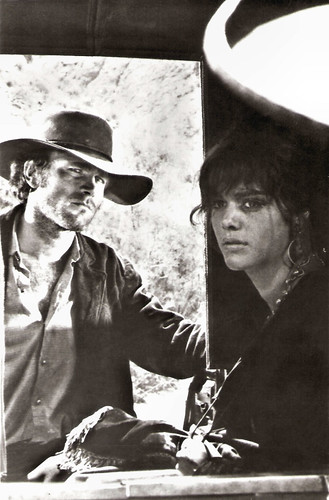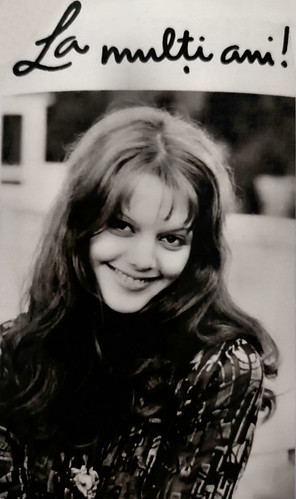
Romanian postcard by Casa Filmului Acin. Photo: Tina Aumont and Franco Nero in L'uomo, l'orgoglio, la vendetta/Man, Pride & Vengeance (Luigi Bazzoni, 1967).
Yugoslavian postcard by Cik Razglednica.
The summer of '68
Maria Christina Aumont was born in Hollywood, US, in 1946. She was the daughter of French Jewish actor Jean-Pierre Aumont and Dominican actress Maria Montez, who were both Hollywood stars at the time. Jean Cocteau wrote a poem for her birth ‘La Fille aux étoiles’ and Marlene Dietrich sang lullabies while cradling her. Her mother died when Tina was only 5. Later she said about her mother in an interview: “I regret not remembering her clearly, because I was too little when she died. Even though I have a living mental image of her, which I attribute to, while years were passing, her remembrance was always close to me through the conversations with my father, my aunts, my uncle François, well, from my whole family.”
During her teen years and the first years of her youth, Tina lived simultaneously with her paternal uncle and his wife and with her father, who made a new home. Five years after Maria Montez's death, Jean-Pierre got married again to the Italian actress Marisa Pavan, twin-sister of Pier Angeli. The relationship between Tina and Marisa wasn't good. In 1963, the 17-year-old Tina married actor and film director Christian Marquand, a friend of her father. She made her debut as Tina Marquand in the spy spoof Modesty Blaise (Joseph Losey, 1966) starring Monica Vitti. In France she also made La Curée/The Game is Over (Roger Vadim, 1966) starring Jane Fonda. In Italy, she appeared in the comedy Scusi, lei è favorevole o contrario?/Pardon, Are You for or Against? (Alberto Sordi, 1966). In Hollywood, she played Lonetta, the Indian maiden, opposite Dean Martin and Alain Delon in the comic Western Texas Across the River (Michael Gordon, 1967).
Aumont divorced Christian Marquand in 1967, and a year later, she met artist and painter Frederic Pardo. They fell in love and went to live together in Rome. They separated in the 1970s. In Rome, she appeared in Bernardo Bertolucci’s Il sosia/Partner (1968) with Pierre Clémenti. Hal Erickson at AllMovie: “Bernardo Bertolucci was obviously influenced by the films of Jean-Luc Godard and the worldwide political upheavals of 1968 while assembling his feature-film Partner. This unorthodox adaptation of Dostoevsky's 'The Double' studiously avoids traditional linear storytelling and exposition techniques.”
She played Circe in Satyricon/The Degenerates (1969), not the masterpiece directed by Federico Fellini, but a version by Gian Luigi Polidoro. Polidoro registered the title Satyricon for his film first. Fellini fought to use the title for his film but lost the case. He named his film Fellini – Satyricon (1969). Aumont also appeared in Infanzia, vocazione e prime esperienze di Giacomo Casanova Veneziano/Giacomo Casanova: Childhood And Adolescence (Luigi Comencini, 1969) with Leonard Whiting as Casanova, the avant-garde underground film Necropolis (Franco Brocani, 1970), and the political drama Metello (Mauro Bolognini, 1970).
In France, she played in the art film La lit de la vierge/The Virgin's Bed (Philippe Garrel, 1969). Nathan Southern at AllMovie: “Garrel and his cast and crew shot La lit in the summer of '68 (reportedly under the influence of acid and without a script), just a few months after the bouleversement of the riots. In that picture, the filmmakers adapt the Biblical story of Jesus very loosely and non-narratively, using Christ as a metaphoric symbol of the late '60s protest movement - the ‘ultimate hippie.’ The picture also reflects the filmmakers' self-mythologies of existing and functioning as a ‘religious sect.’”

Vintage postcard, no. 301. Very young Tina Aumont with her mother Maria Montez.

Romanian calendar card by Casa Filmui Acin. Collection: Alina Deaconu.
343 notorious women
Tina Aumont played her first lead role in L'Urlo/The Howl (Tinto Brass, 1970) in which Brass explored the changing mood of the Swinging Sixties. Tina played a student activist whose politics move even further to the left after she's raped by police officers. In 1971 Aumont made headlines when she and other ‘notorious women’ signed the 'Manifeste des 343 salopes' in favour of the decriminalisation of abortion. The 343 women who signed the manifesto claimed to have an abortion and that, consequently, they risked criminal prosecution that could reach imprisonment.
During the 1970s, Aumont starred in some prolific Italian productions like the courtroom drama Fatti di gente perbene/The Murri Affair (Mauro Bolognini, 1974) with Catherine Deneuve, the political thriller Cadaveri eccellenti/Illustrious Corpses (Francesco Rosi, 1975), and the scandalous success Salon Kitty (Tinto Brass, 1975), a shocking but stylish tale of decadence in the Third Reich, inspired by a true story. Brass later said she was the most beautiful woman with whom he'd ever worked.
She also worked with Federico Fellini at Il Casanova di Fellini/Fellini's Casanova (1976) featuring Donald Sutherland as the famous lover, and with Roberto Rossellini at Il messia/The Messiah (1975). Besides these prestigious productions, she also starred in many genre films. Examples are the Spaghetti Western L'uomo, l'orgoglio, la vendetta/ Man: His Pride and His Vengeance (Luigi Bazzoni, 1968) starring Franco Nero, and the Giallo I corpi presentano tracce di violenza carnale/Torso (Sergio Martino, 1973). She also starred in the Dutch thriller Lifespan (Alexander Whitelaw, 1975) with Hiram Keller and Klaus Kinski.
Aumont appeared in the Italian-American production A Matter of Time/Nina (Vincente Minnelli, 1976) with Liza Minnelli and Ingrid Bergman. Tina's flamboyant career took a downturn in the late 1970s when she was arrested in Italy in 1978, charged with the illegal importation of 400 grams of opium smuggled in from Thailand in little Buddhas. She was eventually sentenced to three years imprisonment, which she managed to reduce on appeal to nine months. Gio Clairval at her blog Kosmochlor: “To all her films, she brought her magnetic, compelling presence. But Tina loved the needle, and little by little her contracts dwindled to nothing. The French television tried to lure her back into acting, but she seldom kept up with the schedule, and when the dressers prepared her for a scene, they could see the needle holes constellating her arms.”
In the cinema, she appeared in the experimental silent film Rebelote (Jacques Richard, 1983) with Jean-Pierre Léaud. Her scenes in Sale comme un ange/Dirty Like an Angel (Catherine Breillat, 1991) were deleted. In 2000 she retired from film work because she suffered a pulmonary embolism. Her final film appearance was in La mécanique des femmes/ The Mechanics of Women (Jérôme de Missolz, 2000) In 2006, Tina Aumont died in of a respiratory insufficiency in her home in Port-Vendres, France. She was 60. She is buried in Montparnasse Cemetery, Paris, in the same grave as her mother's.
Trailer Il Casanova di Federico Fellini (1976). Source: Danios12345 (YouTube).
Sources: Hal Erickson (AllMovie), Nathan Southern (AllMovie), Gio Clairval (Kosmochlor), Love Luna (Child of the Moon), Vivian Pérez and Luisa Peguero (MariaMontez.org), Anti Star Tina, Wikipedia, and IMDb.
This post was last updated on 28 April 2023.
2 comments:
Thanks so much for including Tina Aumont here at your blog!
We run a blog for her, if any of you want to join :)
http://tina-aumont.blogspot.com
Thanks! xoxo
Thanks! We have added the blog to our blog links.
Post a Comment